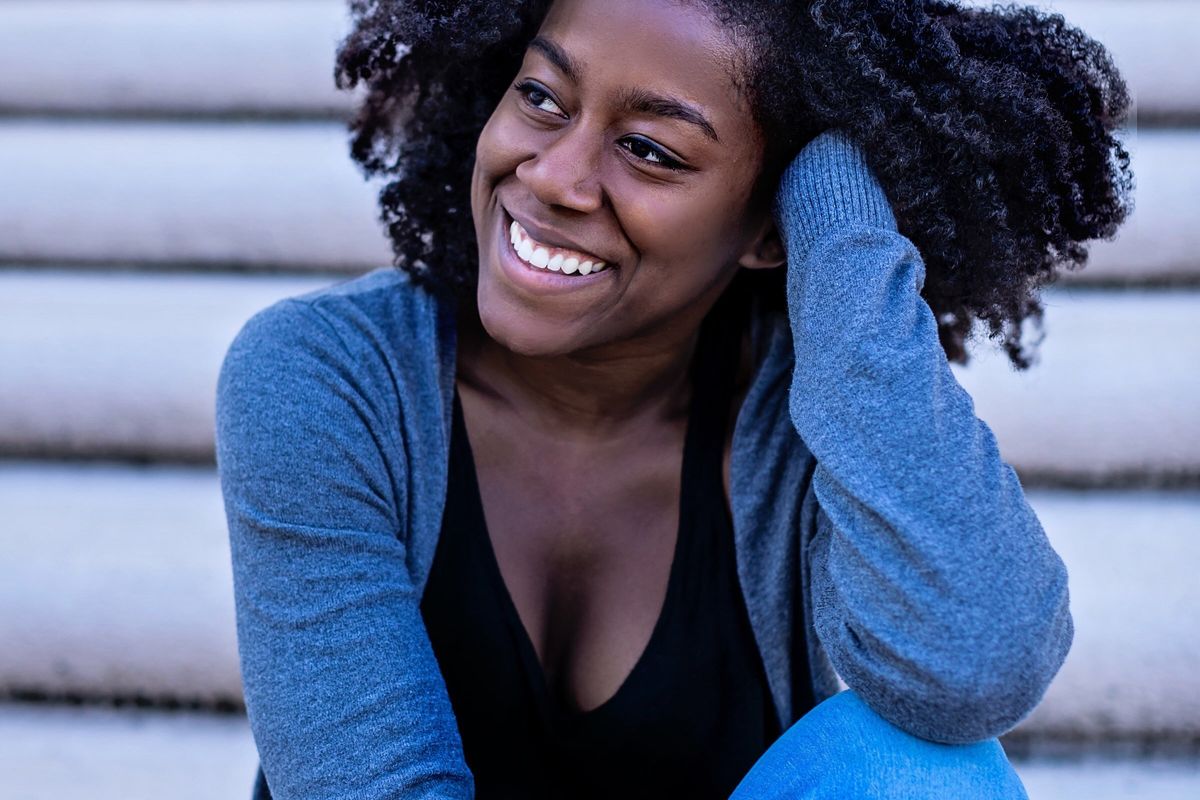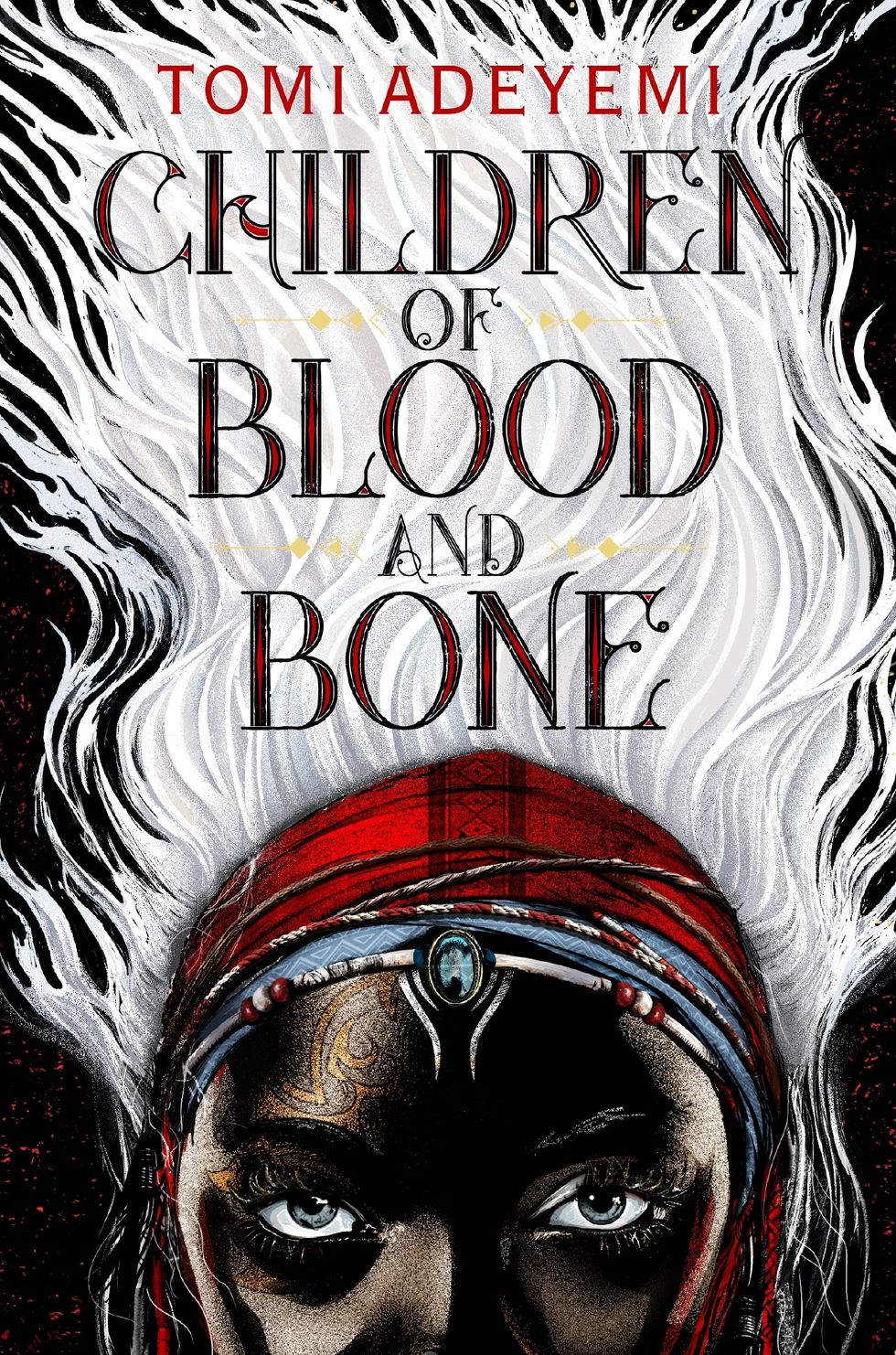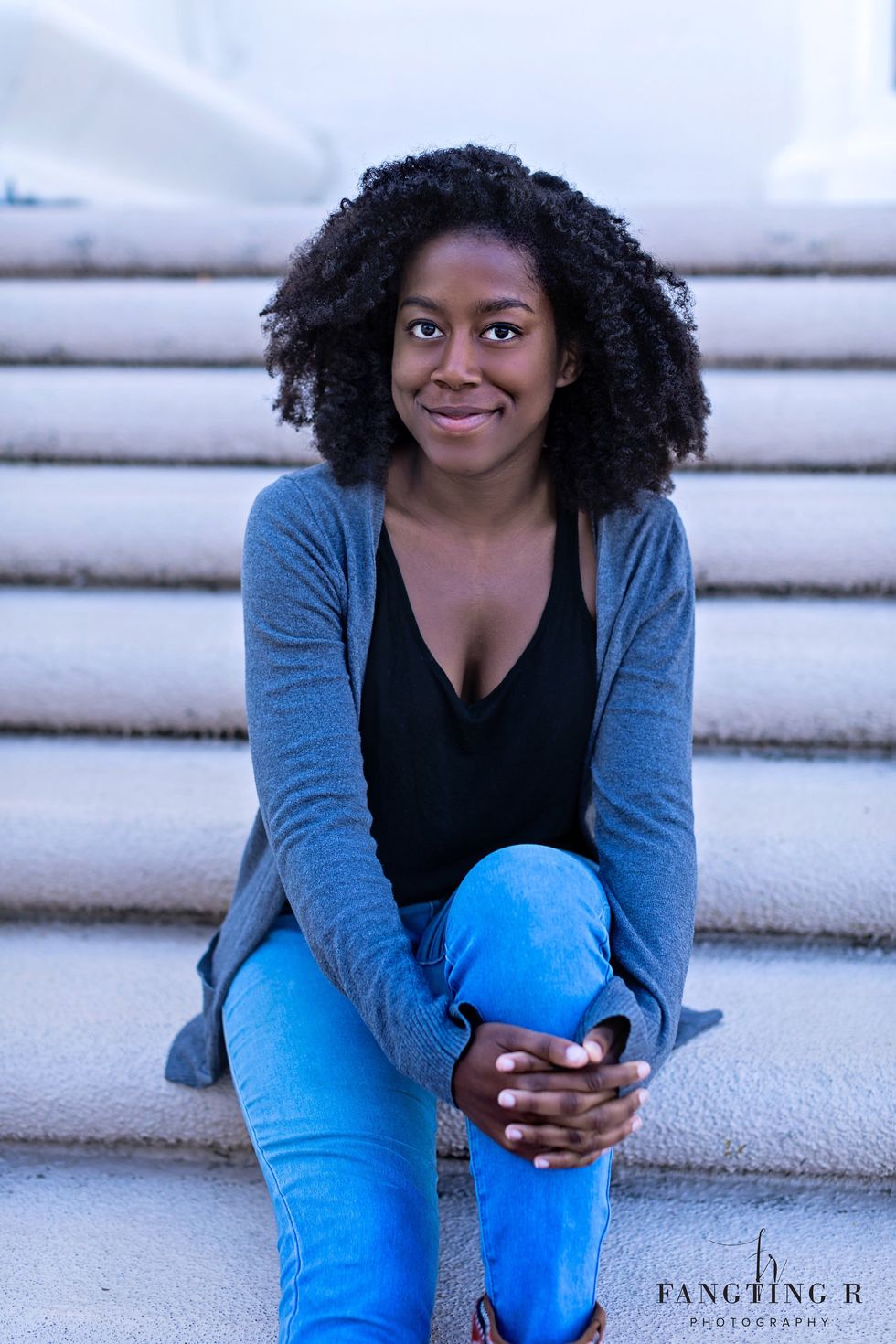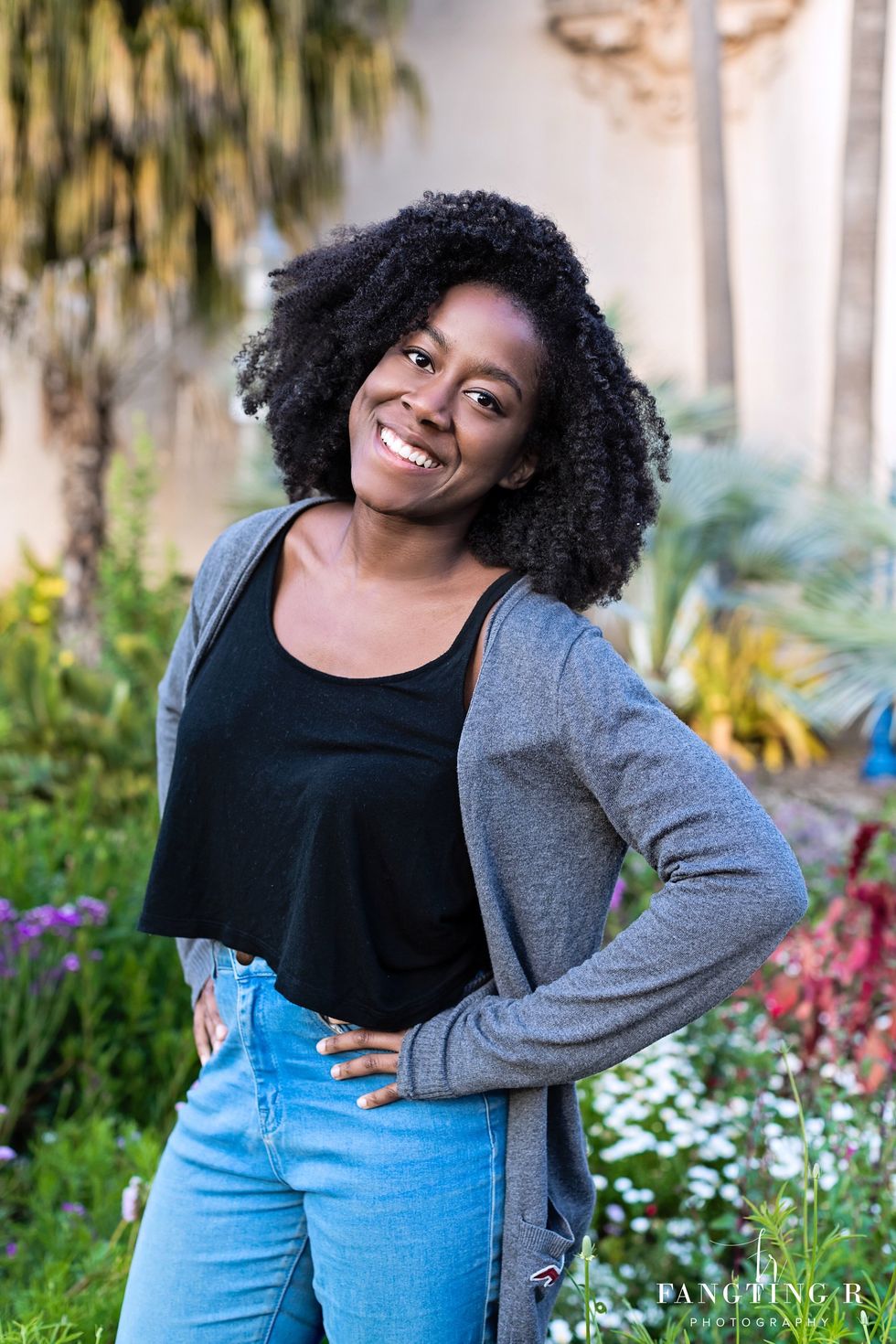Tomi Adeyemi On Writing the Best and Blackest Fantasy Novel of the Year
We speak to the young Nigerian-American author of "Children of Blood and Bone" about the Yoruba themes in her book, colorism, asserting the power of blackness in fantasy and more.

Children of Blood and Bone is the fantasy novel we deserve.
The buzzed about literary debut of 24-year-old Nigerian-American writer Tomi Adeyemi creates a universe where black people are seen, and not just in the periphery way that we appear in many young adult fantasy novels. In Children of Blood and Bone, Hogwarts is traded in for a land called "Orisha," and the bespectacled, wand carrying white protagonist is instead a staff-totting black girl with silver tresses and magical powers.
It's the untold fantasy, transformative in the way it allows for African culture to take center stage. Children of Blood and Bone is brimming with references to Yoruba spirituality, language and tradition. Much like Black Panther—which Adeyemi, like all of us, is a major fan of—the book is another status-quo-defying work that places a black narrative, told from a black perspective, on a global platform. The two are constantly brought up in the same conversations due to their unmistakable blackness as well as their cultural and commercial success. Children of Blood and Bone is sitting comfortably at the top of the young adults best-sellers list where it has been since its release last month.
The novel, which is the first in a trilogy, will soon be adapted into a feature-film, which means that even more afrofuturistic greatness is coming to a screen near you. Adeyemi earned a reported seven figure deal from Fox Studios last year before the novel was even released—herself a living example of the black girl magic she writes about so intentionally in Children of Blood and Bone.
We caught up with the young author to discuss owning her success, the social and cultural themes in her book, Nigerianness, and how there is room for blackness in fantasy.
This interview was edited for length and clarity
How does that feel for you to have the number one young adult book in the country?
It's weird. I think I don't fully get it. One of my best friends, sent me an article about the book yesterday and she was like, "By the way it's been a year. You better take this in." I was just like, "Whoa!" because I didn't even remember that it's been a year, but I do remember exactly where I was when this all started and I remember that so vividly.
I understand that the book is number one, but it's hard for me to sit back and say to myself "You did that."
When did your passion for writing develop and when did you sit down and decide, "Okay. this is what I'm going to do." How did that happen for you?
I've always been writing. But I didn't share my stories with anyone until I was 21. I didn't ever think I could do this professionally. It was a journey of me realizing through through really good people in my life and through the noise in my own head that writing is really what I wanted to be doing.
I was lucky to have really good support systems. My brother is a musician. He made the creative leap. I had him, and then my boyfriend was like, "Why don't you believe in yourself? You can do this." It was really about taking a step back and telling myself I could do it. That it's possible for me to do what I want to do, that there is a market for what I want to do.
I'd never been as passionate about wanting anything as much as I was about wanting this. It was basically applying years of intensity—bred by Nigerian parents—to doing something I was passionate about. I put myself on a timeline, I told my parents a year, but in my head it was really two years. I was just going to see how far I could get. That's how I set off. I was cracking my own whip.

Were your parents like, "Okay. If this doesn't work after a year you actually have to be a doctor or a lawyer?"
Hasan Minhaj has this really amazing comedy special and he's talking about being brown and he's just like, "You have a number of cards you can play. And you're born with them." It's like, "Oh, I'm not going to be a doctor? That's a card. You played it."
I was like, "Okay. I'm playing my card after being a really good Nigerian daughter." Luckily my parents were supportive and I feel extra grateful for that too because I have other first generation friends who are authors who they're parents weren't supportive. I have one friend who the parents didn't talk to her for five years. She told them "I'm not going to go into medicine. I'm going to do this."
Wow, Well, since we're talking about identity and Nigerian culture I guess that's a good time to bring up the Yoruba influences in your book. Why it was so important for you that the story be rooted in Nigerian culture?
Basically, things take on new meaning as they go along. Initially, I discovered the Orisha and I didn't even know they were Nigerian until I talked to my parents. I decided I was going to build a world around this. But you're not going to build a world based off Nigerian gods and goddesses and then have the setting look like Europe. So, I decided to make it an African fantasy. I knew there was a market for it. I couldn't name another one. "Black Panther" wasn't out yet. We hadn't even seen the trailer.
Then I thought, "it doesn't just have to be African." Because people treat Africa like this monolithic thing. I was like, "Ok, I can make this West African. I can make this Nigerian." And suddenly it all came to me, I didn't need to make up a bunch of names for cities because I could use real Nigerian cities. And what's the magic language that they'll speak? It's not going to be Latin. It's going to be Yoruba. So it made it very easy for me to do.
I think Zélie's name appears on the first page so that means that if a million people read this book, they'll know that name. It was really fun and it made everything so much more meaningful because every time I built the fantasy place it was all from imagination. This was the first time it was rooted in something real and something very special to me.
"The book is about living in a society that teaches you to hate what makes you magical."
The protagonist Zélie Adebola, literally embodies black girl magic. What was the inspiration behind her character and what do you think she'll represent for young black girls who read your book?
The inspiration in one sense was this picture, it was a digital illustration of a black girl with luminescent green hair. I had never seen such a magical and beautiful picture of a black girl like that before. I was obsessed. I changed my phone background from my boyfriend to this random picture. I couldn't get her out of my head and I started to think, "Okay, what does a day in her life look like? What is her story? What does her planet look like?" I kept going back to fantasy and thinking of possible storylines. So she kind of just came out. I didn't know her, but I knew where she was going to go. When I opened the first draft I decided that this was how I want to give people a peek at that world.
If I'm like level five, Zélie is level 50. When someone annoys me and I want to hit them, Zélie actually hits them. Zélie doesn't bite her tongue. I feel like we both have the same thoughts and the same impulses, but she acts on them. She's not going to take crap from anyone. I love that. But sometimes you'll have a strong female character and they're just like these emotionless things. Not Zélie she's still a child and she's still having to fight so much. I think[the story is human. She's very human. She's fierce and if you mess with her family, she will mess you up. But she's also scared and hurting and part of the reason she is so fierce is because she doesn't want to be put in a position to hurt again. She's the level 50 version of myself like super eloquent, super fierce, super badass.

You touch on some really heavy topics in this book: systematic oppression, even colorism with the Magi people being discriminated against because they're darker. Why was it important for you, even though this is a young adult book, to weave those heavier themes into the storyline?
Yeah. It is also difficult, too, because we ended of having to change some things. There's so many things I wanted to say but then it's like, "Okay, colorism is about accessing whiteness and we're in a world without whiteness." How do I say what I want to say? We had to scale things back and shift things. So, even what I wanted to do and what I wanted to tell changed throughout, but for me it was important to touch on all of these things because they're real. Especially, with the fact that skin bleaching is a billion dollar industry in Africa. It's disheartening. It's tragic. How does it make sense? I wake up and I'm mostly surrounded by people who don't look like me. But in Africa you're surrounded by people who do look like you. So, why do you want this? But it's obvious that the legacy of colonization is strong and it touches people's daily lives whether you grow up black in America or whether you grow up in Africa. There's so much of our thought process that is still colonized. For me I was learning to embrace my natural hair, and I was like, "Where does all this discomfort stem from? Oh. It's from all these people telling me it's ugly. That it's not okay or it's not professional."
The book is about living in a society that teaches you to hate what makes you magical. For me it was important to touch on those things in whatever way I could, especially for black people because we're really bad about it. That's why I love Lupita so much because every time I see her I'm like, "God. I wish my skin was darker." And I never had that. I had never felt that until I saw her. One day it'll be best for people to be like, "Oh. I love my shade." But it's good when everyone tells you to be lighter and then you see someone and you're like, "God. I wish I was as dark as you." That means something. So, for me it was important to have that messaging. Especially, too with girls because it's definitely more destructive, like people saying "Oh, you're pretty for a dark girl."
For me in college it was having black boys say, "Oh. I don't date dark skinned girls." And I'm like you're darker than me. What are you talking about? Your mom looks like me. So for me, it's a very aggressive clap back against all of that. Amari is beautiful and regal, but Zelie is beautiful, too. I intentionally focus on that more because it's what we need. You read Amari's description and society tells you that people who look like Amari are beautiful. With this, it's about showing people that all of it is beautiful.

I heard you describe your book actually "Black Panther but with magic." So, I don't want to end this without getting your thoughts on the film. And also how does it feel to have contributed in to this movement of black fantasy and African stories being told on a larger, mainstream level through your book.
How does it feel to be associated with Black Panther? It's freaking awesome. The fact that one day we're going to go to the movie theater and probably get to see a spinoff of Black Panther and Children of Blood and Bone. Black Panther is like Children of Blood and Bone's older brother. It's like T'Challa and Shuri. It's so wonderful to have these two things that are in conversation with each other without at all overlapping or cannibalizing one another. There's so much room for both.
For me it's an honor and also Ryan Coogler made my job so easy. Because I didn't know how to pitch this book to adults. This book is written for young adults, I pitched it as the African Last Airbender, but it's a crossover book. But, I didn't know how to pitch it to adults and then Black Panther came out and I was like Ryan Coogler, you're a homie. So, thank you.
What's next down the line for you?
Right now it's book two. Literally the day book one came out people were like, "Yo. When is book two coming?" And I was like, "No. I'm not even at home right now [laughs]."
But I'm excited. It is fun and for me it's a lot about learning the balance of it all because this is completely new. I'm learning how to balance it all out both for me and for my stories. But I'm having fun and that's kind of my focus.
*
Follow Tomi Adeyemi on Twitter and Instagram. You can purchase 'Children of Blood and Bone' here.
- Nigerian-American Author Tomi Adeyemi Makes Time’s 100 Most Influential People List - OkayAfrica ›
- Tomi Adeyemi's 'Children of Blood and Bone' Is a Reminder That the Young People Will Win - Okayplayer ›
- Thuso Mbedu, Damson Idris, and Viola Davis are part of the Star-Studded Cast for the film adaptation of ‘Children of Blood and Bone’ | OkayAfrica ›

